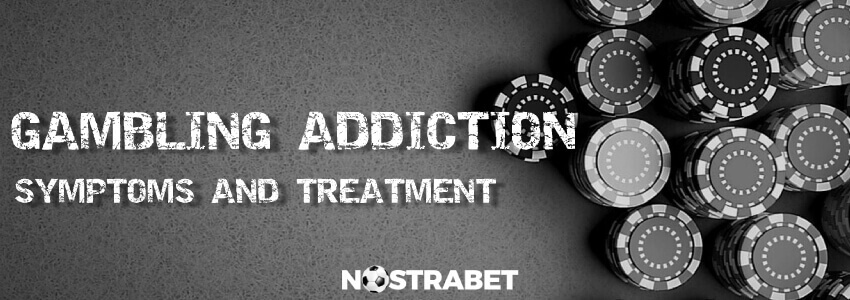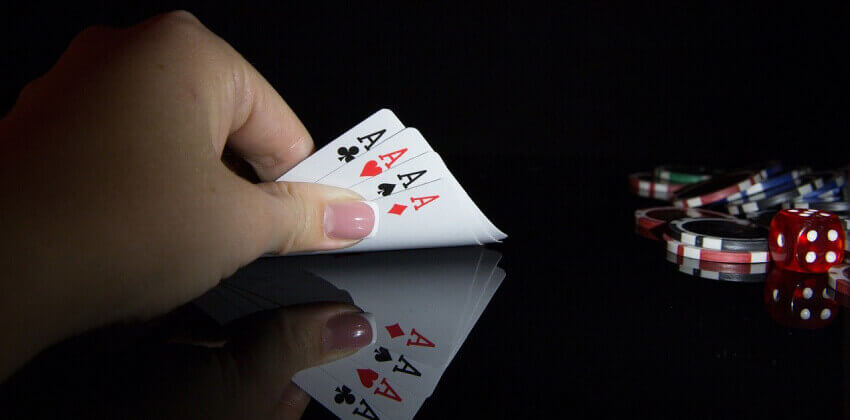There are treatment methods, such as therapy, self-help organizations, and medication. Certain events like stress, trauma, and retirement may trigger problem behaviour.
For every hundred gamblers in the world, between three and five struggle with addiction. Twenty million people admit their habits interfere with their jobs. It’s estimated that at least 10 million people in the US and 430,000 in the UK are gambling addicts.
There are several therapy centres and clinics for this addiction across the world. What options are available to you depends on where you’re located. For example, in the UK, options include the Young Person’s Problem Gambling Clinic, the National Problem Gambling Clinic, the National Centre for Gaming Disorders, and NHS Northern Gambling Service therapy options.

Gambling Addiction – What are the Symptoms?
Symptoms of gambling addiction include:
- Keeps you preoccupied with gambling and how to get more money to gamble
- Makes you feel ashamed and like you need to hide your gambling
- Impacts your relationships negatively
- Leads to depression
- Causes migraines
- Prevents your ability to control your habits
To recognize gambling addiction, look for these symptoms. Experiencing one or two may not mean you have a problem. If several fit your situation, consider seeking help.
6 Causes of Gambling Addiction
The exact causes aren’t entirely understood, but risk factors include:
- Mental health problems
Depression, personality disorders, and anxiety can contribute to this addiction. Additionally, OCD and ADHD can both make the addiction worse. - Biological gender
Men are more likely to experience compulsive gambling. However, women can become addicted more quickly. - Age
Younger and middle-aged people are more likely to develop this addiction. - Medications
Dopamine agonists are prescription drugs used to treat Parkinson’s and restless leg syndrome and can increase compulsive behaviour in some people. - Personal influence
If a family member or friend struggles with addiction, your chances of experiencing it increase as well. - Specific characteristics
People who are competitive, restless, impulsive, or easily bored are more likely to experience it.
Overall, anything that affects impulse control can increase your chance of gambling addiction. Mental health issues, age, medications, and personal characteristics can contribute to this factor.
For example, research has shown that younger people are more impulsive. According to neurologist Dr Frances Jensen, this phenomenon happens because they haven’t fully developed insulin in their brains yet. This process takes years, so the younger you are, the more likely you’ll become addicted.
Is Stress Connected to Gambling Addiction?
Yes, stress can increase your chance of being addicted. As your stress levels increase, so does your impulsivity. Psychologists studying college students found that higher stress leads to higher impulse disorders.
Is Retirement a Cause for Gambling Addiction?
Yes, retirement can contribute to it. Retirement causes a sudden behaviour change, as you no longer have a job to go to throughout the week.
Retirees find themselves bored with so much free time and use gambling as a source of excitement or stimulation. Psychologists have found that boredom leads to diminished self-control and an increase in poor decision-making.
How to Discover Gambling Addiction?
Nine signs are listed below:
- You feel irritable and restless when you aren’t gambling.
- You have to spend more and more money to feel excited.
- You think about gambling often and plan for your next session.
- You’ve tried to stop multiple times but been unsuccessful.
- You continue to gamble even after losing money.
- You gamble when you’re upset.
- You lie about your habits.
- You ask others for money to gamble.
- Your relationships or work are suffering.

Look for these signs within the last 12 months. If you’ve experienced at least four of them, you have a gambling addiction.
Types of Gambling Addiction
Psychiatrist Robert Custer identified six categories of gambling addicts. One type is the professional, who considers it occupation and doesn’t think they have an addiction.
Another is the antisocial personality gambler, who’s more likely to fix bets and may have a history of unlawful behaviour. On the other hand, casual social gamblers bet infrequently, so they rarely develop problem habits.
Serious social gamblers use it as a primary form of entertainment. While they can control the habit, they are more likely to develop an addiction. Relief and escape gamblers are at an even higher risk. They gamble on fighting anxiety, depression, and other negative emotions.
The highest risk gamblers fall into the compulsive-pathological category. They’ve lost all control over their habits.
How Big of a Problem is Gambling?
Research has found that 26% of the world’s population gambles, translating to 1.6 billion people. According to the National Center for Responsible Gambling, 80% of adult US citizens gamble yearly.
Research done by the UK Gambling Commission and Office for National Statistics shows that in 2020, 47% of British people gambled in four weeks. According to experts, the Asia-Pacific market is the fastest-growing in the gambling industry.
In 2014 and 2016, Australia and Singapore lost the most money to gambling per adult citizen. The African Exponent stated that one in ten Africans gambles frequently. For most losses per country, China and Japan ranked third and fourth, with Australia fifth.
How to Cure Gambling Addiction?
To heal from a gambling addiction, try the following:
- Practice self-help
You can also work on healing your gambling addiction at home. Self-help methods include learning to relieve stress in other ways, joining a support group, and strengthening your support system. - Consider your motivations
To beat gambling addiction, consider what drives you to gamble and then find alternative methods to replace this behaviour. For example, if you gamble for the adrenaline rush, start playing a sport or competitive hobby instead. - Go to therapy
Cognitive or behavioural therapy can help. Behaviour therapy teaches you to reduce the urge, while cognitive therapy helps you replace irrational, unhealthy, or harmful beliefs. - Ask about prescription medications
Some medications help reduce the urge to gamble. You should talk to your doctor about the possibility of being prescribed these drugs. A few options include antidepressants. - Prioritize family-help
Methods like family or marriage therapy can also assist you in working through your addiction issues. - Work on self-respect
In the beginning stages, a gambling addiction can make you feel better about yourself as you imagine financial gain and social acceptance. Once you’ve gambled away your money, though, it decreases your self-respect significantly.
To completely heal, you’ll need to rebuild your self-esteem. Focus on your strengths and challenge your negative thoughts.
These methods focus on different aspects of gambling. Therapy and medications focus on the gambling behaviour itself. In contrast, self-help and motivation considerations focus on the circumstances driving that behaviour.
On the other hand, family help and self-respect help you deal with the aftermath of your addiction. To fully heal, you’ll need to use multiple methods.
What are the First Three Treatment Steps of Gambling Addiction?
Treatment steps include:
- Admitting you have a problem: Many people struggle with this step. Still, treatment methods won’t work if you’re unwilling to admit you’re an addict. If you’re pressured into treatment, you’ll most likely resist it.
- Seek professional help: Trying to overcome addiction is incredibly challenging on your own. Professionals will tailor a treatment plan to your specific needs and help you with the treatment options listed above.
- Prevent relapse: Even after treatment, some people return to their addiction. To prevent this, make sure you don’t associate with gamblers or gambling environments and keep in contact with a therapist or sponsor.
Other recovery skills include staying focused on your goal and recognizing and avoiding your triggers.
Is Therapy Useful for Solving Gambling Addiction?
Yes, therapy helps solve gambling addiction. With cognitive behavioural therapy, you explore your thoughts and behaviours. The therapist then recognizes unhealthy patterns and enables you to change them into positive ones.
For gambling addiction, this means replacing ideas like “I’ll win a lot and be able to pay off my bills”. Therapist Robin Hornstead says that you have to “challenge your beliefs about what’s a healthier strategy with your money”.
Can Gambling Movies Lead to Gambling Addiction?
Yes, they can create gambling addiction. Cognitive psychologist Nigel Turner found that many gambling movies show it positively with miraculous wins, and even those that show problem gambling have happy endings that involve the person winning everything back.

The depictions are irresponsible because they encourage a distorted reality and rarely show someone seeking help. Watching these films can reinforce gambling addicts’ unhealthy beliefs. However, none of these movies is banned.
Should a Gambling Addict Be Honest with His/Her Family?
Yes, an addict should explain it to his or her family for many reasons. For one, your addiction will affect your wife, kids, mother, etc. They’ll be more stressed because of their worry about your addiction and how it’s affecting your finances.
Additionally, you should tell them because family counselling is an essential step of recovery. Lastly, telling your family will allow them to support you through your journey to heal from gambling addiction.
Are Some Games More Addictive Than Others?
Yes, some games are more addictive than others. Slots are the most addictive for new players because they require fewer skills than other options like poker. Slot machines earn more in a year than corporate giants McDonald’s, Starbucks, Burger King, and Wendys combined.
Roulette can also be incredibly addictive. Fairer Gambling found a much higher number of these machines in poor areas. Playing roulette is simple, enticing to desperate people looking to win some cash.
Get more Help on Gambling Addiction
There are various organisations, hotlines and support groups that will help you or your friend overcome problem gambling habits. Let’s take a look at some of them:
- Gamblers Anonymous help globally
- Gamcare in the UK
- Gambling Help Online in Australia
- Centre of Addiction and Mental Health in Canada
- The National Council on Problem Gambling Helpline in the USA
- GAMSTOP
